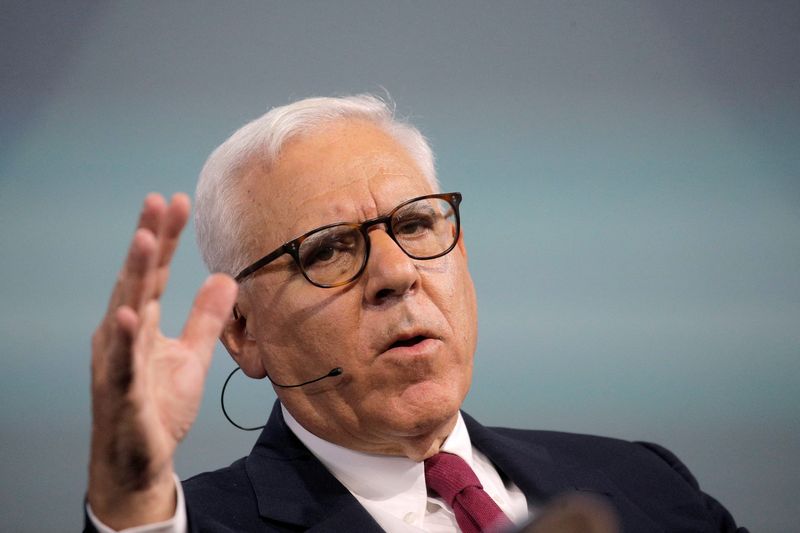
© Reuters. FILE PHOTO: David Rubenstein, Co-Founder and Co-CEO of Carlyle Group, speaks during the Skybridge Capital SALT New York 2021 conference in New York City, U.S., September 13, 2021. REUTERS/Brendan McDermid
AMZN
-1.94%
Add to/Remove from Watchlist
Add to Watchlist
Add Position
Position added successfully to:
Please name your holdings portfolio
Type:
BUY
SELL
Date:
Amount:
Price
Point Value:
Leverage:
1:1
1:10
1:25
1:50
1:100
1:200
1:400
1:500
1:1000
Commission:
Create New Watchlist
Create
Create a new holdings portfolio
Add
Create
+ Add another position
Close
CG
-2.24%
Add to/Remove from Watchlist
Add to Watchlist
Add Position
Position added successfully to:
Please name your holdings portfolio
Type:
BUY
SELL
Date:
Amount:
Price
Point Value:
Leverage:
1:1
1:10
1:25
1:50
1:100
1:200
1:400
1:500
1:1000
Commission:
Create New Watchlist
Create
Create a new holdings portfolio
Add
Create
+ Add another position
Close
META
-5.86%
Add to/Remove from Watchlist
Add to Watchlist
Add Position
Position added successfully to:
Please name your holdings portfolio
Type:
BUY
SELL
Date:
Amount:
Price
Point Value:
Leverage:
1:1
1:10
1:25
1:50
1:100
1:200
1:400
1:500
1:1000
Commission:
Create New Watchlist
Create
Create a new holdings portfolio
Add
Create
+ Add another position
Close
By Chris Taylor
NEW YORK (Reuters) – Next time you are visiting the National Archives Museum in Washington, D.C., check out the 1297 copy of the Magna Carta, essentially the first written constitution in European history.
It may have been drawn up under England’s King John, but these days it belongs to David M. Rubenstein.
Rubenstein, the co-founder of private equity giant The Carlyle Group (NASDAQ:CG), not only bought that document, but copies of the Declaration of Independence and the Emancipation Proclamation besides – all of which he gives to institutions for public display.
To learn how Rubenstein amassed those kind of resources, look no further than his new book, “How To Invest: Masters on the Craft.”
In it, Rubenstein includes not only what he has learned over the years, but insights from other boldfaced names in the investing universe – such as Bridgewater Associates’ Ray Dalio, BlackRock’s Larry Fink, Renaissance Technologies’ Jim Simons, John Paulson of Paulson & Co. and more.
That crowd is a long way from his Baltimore childhood. At that time, there was not a whole lot of investing going on, with his father working a blue-collar existence for the Post Office, living paycheck-to-paycheck.
Starting from there and making it to the ranks of billionaires is no small feat, but Rubenstein is bracingly honest about both his investing misses as well as his hits. His biggest home run, of course, was starting Carlyle, raising an initial $5 million that has turned into a behemoth with $376 billion in assets under management, sitting astride the world of private equity.
His whiffs, meanwhile, include passing on little startups like Meta’s Facebook (NASDAQ:META) and Amazon (NASDAQ:AMZN), going so far back that he remembers when Amazon CEO Jeff Bezos used to hand-deliver every book order to the Post Office himself.
“The best investors have an ability to forget their mistakes and go onto the next thing, but I don’t have that,” Rubenstein told Reuters. “I think about that all the time. How could I have been so stupid?”
Nevertheless, Rubenstein seems to have done alright, with a net worth currently estimated by Forbes at $3.2 billion. His family office steers his personal investments and sticks not to more traditional asset classes like publicly-traded stocks or fixed income, but the area he knows best – private equity.
A couple of investments he singles out: Healthcare firm Redesign Health, which has grown to a valuation of well over $1 billion. He was also involved in the purchase of ticketseller StubHub shortly before the COVID-19 pandemic, labeled by Forbes at the time as the “Worst Deal Ever” because of the unfortunate timing, although prospects have rebounded nicely since then.
RUBENSTEIN’S ADVICE TO INVESTORS BIG AND SMALL
When it comes to philanthropy, Rubenstein takes a surprisingly hands-on approach – no foundation, no staff, just him. He does not take pleasure in having to turn people down, but he does enjoy following his own rules, including starting something that would not get started otherwise; something he is intellectually interested in, in which he can be involved beyond just writing a check; and something which will see real progress in his lifetime.
Rubenstein is also one of the early signatories of the Giving Pledge, the Bill Gates-led initiative encouraging America’s wealthiest to give away at least half their fortunes – a roster that has since grown to over 230 people.
But for mom-and-pop investors out there, Rubenstein has guidance as well, especially in this current downturn, which has so many people on edge looking at their cratered 401(k)s.
“The most common mistake investors make is that they get out of the market at the wrong time,” Rubenstein says. “When markets are depressed, that’s the time to actually invest. They shouldn’t panic and sell everything when the market goes down.”
For most retail investors, Rubenstein suggests an approach that hews to the fundamentals: Index funds, diversification, low fees, transparency and realistic expectations about rates of return. In other words, do not think of yourself as a genius who can beat the market, because realistically that is just not going to happen.
And do not think this book is going to turn you into Warren Buffett, either.
“It won’t automatically make you a great investor,” Rubenstein says. “But it can give you insight into some of the greatest investors in America, and how they became great – and how you can do a better job managing your own money.”
Source: Investing.com




























